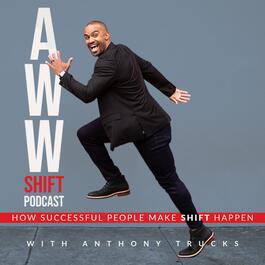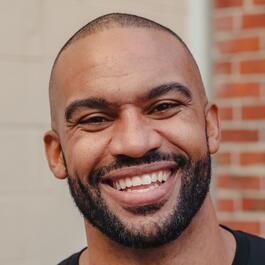
Changing Human Behavior with Eric Zimmer
In today's episode, our guest is Eric Zimmer. He is a behavior coach, certified interfaith spiritual director, podcast host, and writer endlessly inspired by the quest for a greater understanding of how our minds work and how to create the lives we want to live intentionally. Eric has worked as a behavior coach for the past 20 years, coaching hundreds of people from around the world on how to make significant life changes and create habits that serve them well in achieving the goals they’ve set for themselves. He currently hosts the award-winning podcast, The One You Feed, based on an old parable about two wolves at battle within us. [2:58] Why should I listen to you? My expertise in everything I discuss, share, and teach comes from being in the trenches. I have personally coached and worked with over 500 individuals from various parts of the world. Additionally, I have interviewed over 500 intelligent individuals on these topics. I believe my knowledge and experience in these areas are based on these three key factors: my personal experience, my desire to assist others, and my constant pursuit of knowledge from the brightest minds in the field. [3:50] Can you share a little bit of your background? Although I grew up in a stable, middle-class suburban environment, there were still some gaps in my upbringing that influenced who I am today. However, I can't solely blame my circumstances for the choices I made. By the age of 24, I had hit rock bottom - I was a homeless heroin addict weighing only 100 pounds, with Hepatitis C and several felony charges looming over me. But despite all that, I was able to rebuild my life into something fulfilling and rewarding. The lessons I learned from my experiences can apply not only to those in similarly dire situations but to anyone struggling to live a life aligned with their values, cope with difficult thoughts and emotions, and manage their challenges. These are all universal struggles that we all face to varying degrees. [5:35] What got you here? It's difficult to pinpoint one specific cause for addiction or mental health issues. There are often multiple factors at play, and it can be a combination of genetics, environment, upbringing, and personal choices. In my case, I had parents who were struggling with their mental health issues, and I was a sensitive child who turned to stealing, drugs, and alcohol as a way to cope with my emotions. But ultimately, I believe that it's important to focus on the present moment and how to move forward, rather than getting stuck in the past and trying to assign blame or find a single cause for our struggles. [17:10] How did you approach moments that feel like you don't know what you're doing? It's interesting because there are both catalyst moments and thousands of small decisions that follow. For instance, deciding to become an NFL player may be a catalyst moment, but it's the countless grueling workouts and dedication that follow that ultimately lead to success. Recovery and sobriety are similar in this way. There may be epiphany moments where you realize you need help, but it's the ongoing commitment to making the right decisions that lead to long-term recovery. In my own experience, the catalytic moment was when I realized I needed long-term treatment while living in the back of a van. From there, it was a series of small decisions like going to meetings, working with a sponsor, and going to the gym that led to true hope and belief that I could change. Consequences are important, but they're not enough. We need both a true desire to change and a belief that change is possible to achieve long-term recovery. [22:14] What are some of the lessons that you learned during these moments? Living according to our values sounds great, but it's difficult to do and often leads to an unpleasant reflection. In my coaching programs, we do a deep dive into values, which can be challenging for people as it brings them face-to-face with areas they're falling short in. However, I believe it's helpful to reframe this by recognizing that we'll always veer off course, just like a plane constantly needs to refocus on its destination. Life is full of demands and distractions, so it's natural to get off track. The key is to minimize emotional drama and get back on course as soon as we realize we're off. By doing this more often without beating ourselves up, we'll be more willing to course-correct. On the other hand, if we spiral into self-criticism every time we slip up, we're less likely to get back on track. I always remind my coaching clients that getting off track is inevitable, but the important skill is learning to get back on track quickly. [25:47] What are some of the behaviors people may not be doing and are not aware of the dire consequences? In my experience coaching many people, I've noticed that certain behaviors can be problematic in the long run, even if the individual is not aware of their negative impact. However, it's important to note that what may be problematic for one person might not be an issue for another, depending on their values and circumstances. For instance, if someone has children and spends several hours a day playing video games, it could be problematic as it takes away from quality time with their kids. On the other hand, if someone is a bachelor and enjoys playing video games, it may not be an issue. One behavior that tends to have long-term effects is diet, which can have compounding consequences for better or worse. [30:36) What are some of the behaviors you put into place that helped you? I have struggled with depression for much of my adult life, which may or may not be linked to my addiction. Therefore, I prioritize my physical and mental health, including exercise, healthy eating, and sufficient sleep. While these behaviors are important for long-term health, they are crucial for my emotional and mental well-being in the present moment. Recognizing that these health practices make me happier and more fulfilled was a significant shift for me. Another crucial behavior is meditation, as I find contemplative practices and time spent in silence to be valuable. Additionally, I frequently ask myself if my actions align with my values and goals, as it is easy to fall into autopilot and live a life that doesn't reflect who we want to be. By reflecting on what matters to me and regularly adjusting my behavior accordingly, I am more likely to live a fulfilling life aligned with my values. [37:00] Sometimes, our journey is full of ups and downs like a roller coaster. What do you have to say about that? I believe that accepting the uncertainty and doubt that comes with any creative endeavor or building a new business is essential. For instance, my current project is writing a book, and it's natural to experience self-doubt and uncertainty. However, what has helped me is learning from other successful authors by having them on my show and hearing about their struggles. Even the most accomplished individuals go through similar challenges, but they have learned to manage and navigate them skillfully. Monitoring my progress and adjusting accordingly has been crucial in recognizing and handling any uncertainty that arises. Creating something new inherently involves fear and doubt, and these feelings are not a sign of inadequacy, but instead, they are part of the process. Building a new business is no different, and moments of uncertainty and doubt are common. It is essential to understand that these challenges are normal and not to let them discourage you. It's a misconception that successful individuals have it easy, but the reality is that everyone struggles with self-doubt and uncertainty at some point in their journey. [41:45] Do you mind sharing with us what the parable in your podcast means? My podcast always starts with a parable, the origins of which are unknown, but many of you may have heard it. It speaks of two wolves that reside within us - one representing kindness, bravery, and love, and the other representing greed, hatred, and fear. The question is, which wolf will win? The answer is the one that you feed. I love this parable because it's a reminder that we have a choice in our actions and that we all have both good and bad within us. It's natural to have doubts, fears, and uncertainties, but it's how we respond to them that matters. The first step to responding to our negative thoughts is recognizing them and understanding why we want to change. Awareness is key to any kind of change. We should not be attached to our thoughts, as they may not always be true or accurate. They are simply the result of various causes and conditions that have accumulated over time, along with chemical processes in our minds. Some thoughts are closer to reality than others, and we need to learn to work with them more skillfully and smartly. Studies show that about 85% of our thoughts are negative and 95% of them are repetitive. It's important to take inventory of our thoughts and analyze them so that they don't run rampant. [47:45] What promise did God make to the world when he created you? There is hope. Key Quotes [32:40-32:44] Spending some amount of time in silence and reflection on things is valuable. [40:48-40:51] Little by little, a little becomes a lot. How to connect with Eric Zimmer Instagram: https://instagram.com/one_you_feed Facebook: https://www.facebook.com/1ufeed Twitter: https://twitter.com/oneyoufeed
From "Aww Shift"




Comments
Add comment Feedback